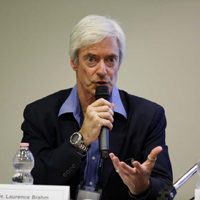Laurence Brahm: We have a smaller planet
January 18 , 2019What are the differences between Chinese and Westerners in terms of their life attitude? I think those differences are becoming less and less, as there are more and more similarities. Those similarities are a factor of communication, trade, globalizing ideas, and the fact that we are having more global integration among more countries and cultures.
You find Chinese people here drinking red wine and eating Western food. You go to America, and you find people eating Chinese food, Japanese food, Thai food and so on. You see Westerners learning traditional Asian martial arts. Now in the gyms trending across China, you see Chinese learning mixed martial arts fighting and Western boxing. The truth is that we have a smaller planet.
This is a whole different era today. Chinese are all over the world. They are buying the international brands and, in many ways, driving the consumption of those brands. They have no barriers and no surprises. It’s not about seeing the foreigners, as they’ve seen the world. And they are bringing a lot of those ideas back, just like during the Tang Dynasty (618-907), when Chang’an was the melting pot and everything was coming in. In many ways, China’s major cities today, and now the second-tier cities, are melting pots. All kinds of international influences are coming in and mixing with Chinese culture in this kind of fusion complex, which has always really been the foundation of China’s own unique culture. It takes, it absorbs, it brings things together and it makes them uniquely Chinese.
What’s happening is that we see more communication. With that, we will have more understanding, and a breakdown of barriers and stereotypes. You can enjoy my world, yes, and I can enjoy your world. In that sense, our world is smaller. What’s very important is if we can work together to save that world against the costs and threats of climate change, of human-induced pollution. Remember, this planet is just a little spaceship orbiting in a huge universe. We all have to work together to steer it in the right direction.
While China was struggling with complete scarcity in the past, it is now one of the biggest buyers of luxury goods. Has the accumulation of wealth brought changes to the Chinese people’s value system?
There’s a concept in economics called conspicuous consumption. When people suddenly have money, they want to show it. I remember when I just came to China in 1981, this was an economy of scarcity. There was nothing. You had money, but there was nothing to buy. Slowly with investment, with trade, with integration with the rest of the world, they began to have things. In the 80s, they began to have electronics, and they filled their homes with refrigerators, washing machines and things that they never had before. Previously, people had to buy their food that day to cook for that day, because there were no refrigerators. At the end of the 80s, people’s homes were filled with electronics. It was not about being able to meet their needs; it was about wanting to show others that they had accumulated their wealth. Then they began the cycle of brand buying and showing off wealth — who has the bigger house, or who has the bigger car.
But that’s not the narrative of the young generation in China today. I’ve seen more young Chinese as hippies in Nepal and India. They see the world differently from their parents. Today’s youth in China are coming up with really creative ideas and having a whole different vision of values, and of presenting those values not through conspicuous consumption, but alternative styles. The whole vision of the Chinese future is changing very rapidly with the new generation. You can’t lock onto the old conspicuous consumption and say that is China. That was China. But now with the millennial generation, and younger, it’s changing really fast.
One of the things that’s happening now is that, with more and more foreign students coming to China and more Chinese students going abroad, a lot of the barriers that existed in the old generations are coming down, and they are coming down quite quickly. It’s one thing to read about China in the newspaper, or to see it on the news. It’s another thing to have gone to China to study, to work, to live, to be with people and to make friends locally. It’s this type of people-to-people communication. If it can be brought to the level of politicians, there will be no trade wars, and there will be no conflicts.
It’s not a question of integrating Chinese culture with the world’s culture, or vice versa. I think it’s a question of expanding the bandwidth of understanding. The more we understand something, the less we are afraid of it. Fear arises from lack of understanding. Fear arises from the unknown. If we know, then we are not afraid.
One of the things that happens to somebody when they leave their culture and live in another culture is that they evolve into that culture. You have in many ways a whole generation now of hybrid cultures and fusion cultures. I’d like to think of us as global nomads. We are international citizens who don’t necessarily belong to one culture or another. Hopefully we can embrace many cultures, and in that respect, bring our planet a little closer together.

Laurence Brahm, a senior research fellow at Center for China and Globalization(CCG), an author of Zhu Rongji and the Transformation of Modern China.
Topical News See more






